Unit 13 We're trying to save the earth Section A Grammar focus-4c课件(共22张PPT) 人教版九年级全册
文档属性
| 名称 | Unit 13 We're trying to save the earth Section A Grammar focus-4c课件(共22张PPT) 人教版九年级全册 |

|
|
| 格式 | pptx | ||
| 文件大小 | 2.0MB | ||
| 资源类型 | 教案 | ||
| 版本资源 | 人教新目标(Go for it)版 | ||
| 科目 | 英语 | ||
| 更新时间 | 2024-09-14 00:00:00 | ||
图片预览

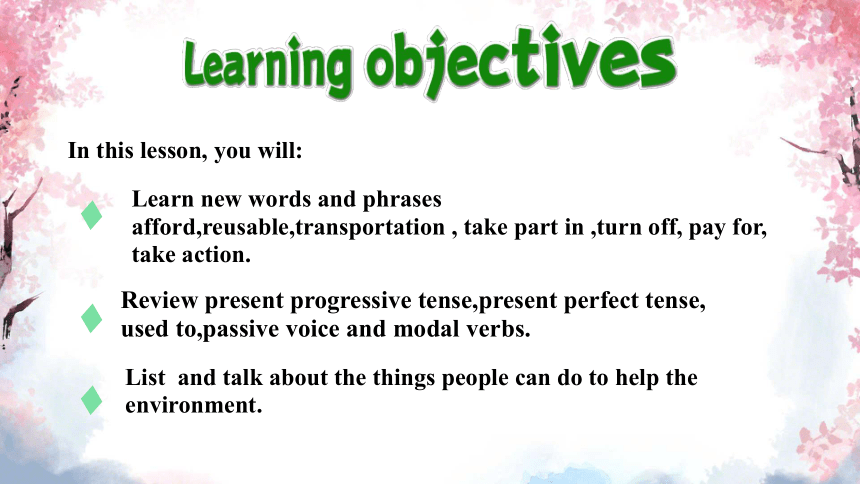

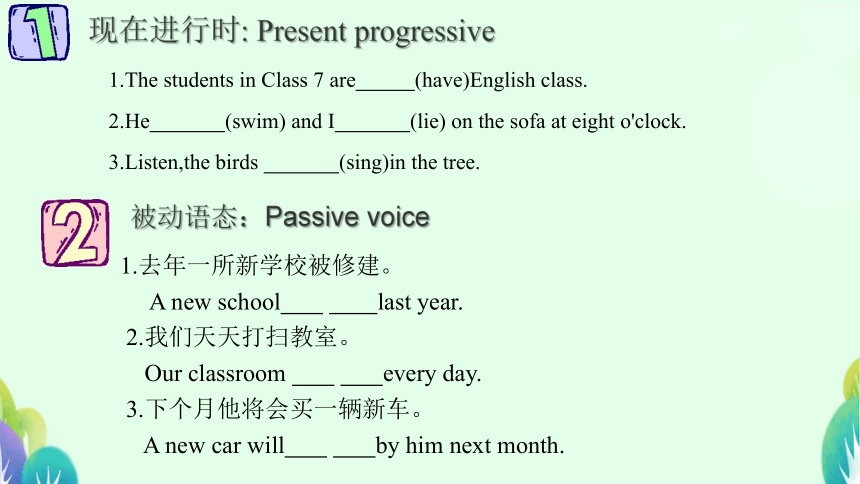
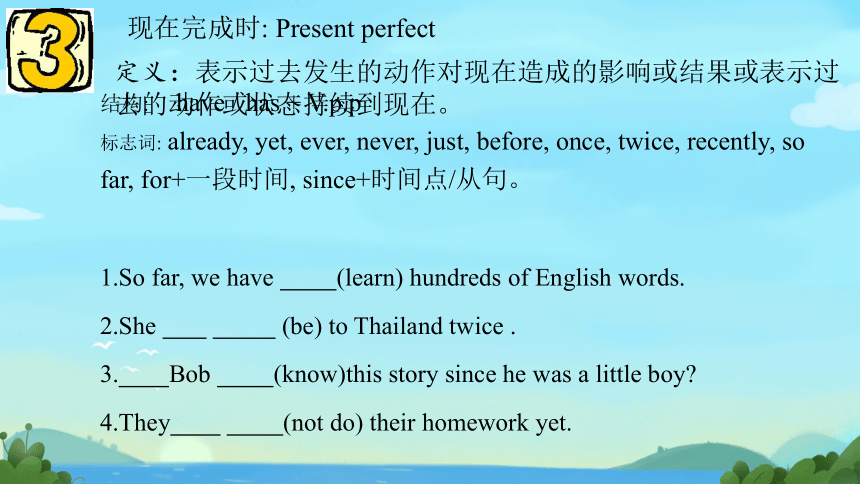
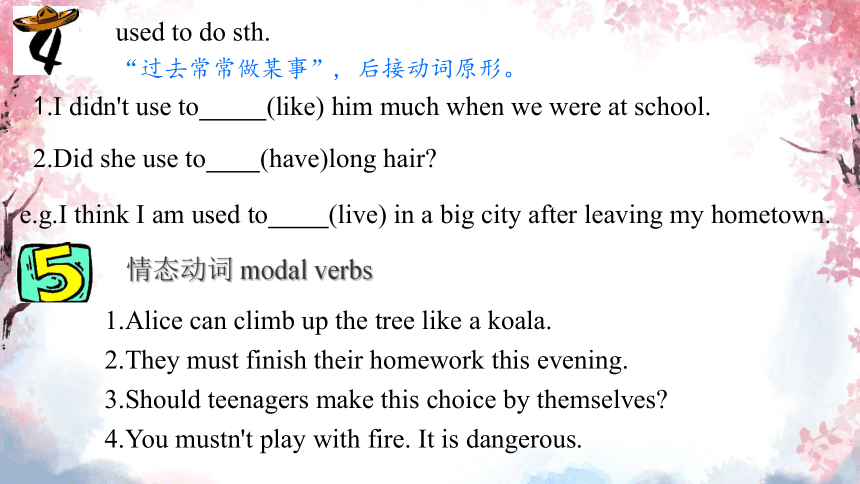
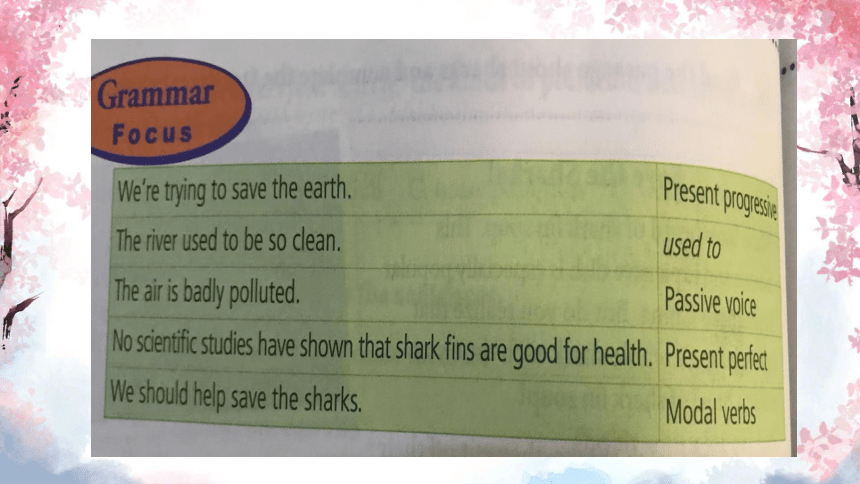
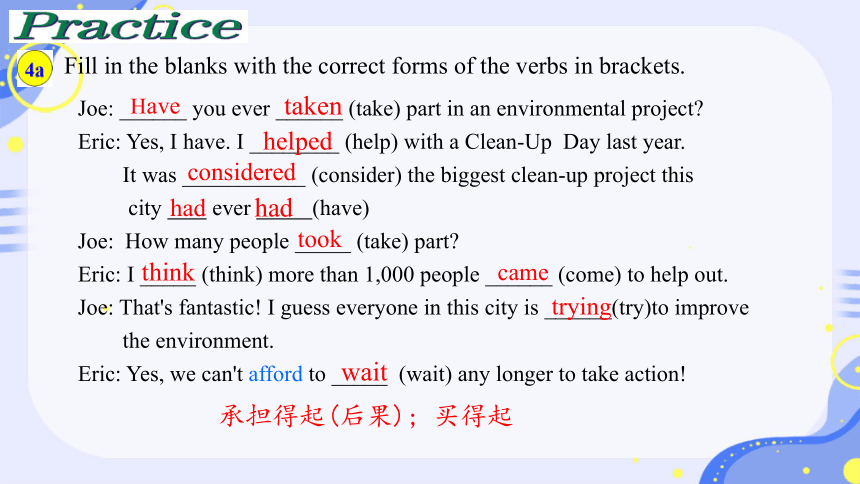
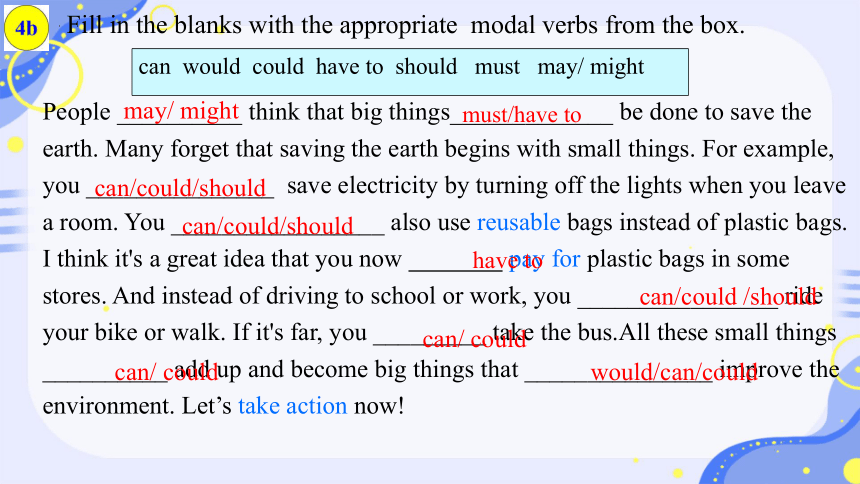
文档简介
(共22张PPT)
Grammar focus-4c
In this lesson, you will:
Review present progressive tense,present perfect tense,
used to,passive voice and modal verbs.
List and talk about the things people can do to help the environment.
Learn new words and phrases
afford,reusable,transportation , take part in ,turn off, pay for,
take action.
九(17)班
第四中学2022年
暑假防溺水安全教育
线上主题班会
现在进行时: Present progressive
1.The students in Class 7 are (have)English class.
2.He (swim) and I (lie) on the sofa at eight o'clock.
3.Listen,the birds (sing)in the tree.
被动语态:Passive voice
1.去年一所新学校被修建。
A new school last year.
2.我们天天打扫教室。
Our classroom every day.
3.下个月他将会买一辆新车。
A new car will by him next month.
现在完成时: Present perfect
定义:表示过去发生的动作对现在造成的影响或结果或表示过 去的动作或状态持续到现在。
结构: have / has + V.p.p
标志词: already, yet, ever, never, just, before, once, twice, recently, so far, for+一段时间, since+时间点/从句。
1.So far, we have (learn) hundreds of English words.
2.She (be) to Thailand twice .
3. Bob (know)this story since he was a little boy
4.They (not do) their homework yet.
1.I didn't use to (like) him much when we were at school.
2.Did she use to (have)long hair
e.g.I think I am used to (live) in a big city after leaving my hometown.
used to do sth.
“过去常常做某事”, 后接动词原形。
情态动词 modal verbs
1.Alice can climb up the tree like a koala.
2.They must finish their homework this evening.
3.Should teenagers make this choice by themselves
4.You mustn't play with fire. It is dangerous.
Fill in the blanks with the correct forms of the verbs in brackets.
Joe: ______ you ever ______ (take) part in an environmental project
Eric: Yes, I have. I ________ (help) with a Clean-Up Day last year.
It was ___________ (consider) the biggest clean-up project this
city ever (have)
Joe: How many people _____ (take) part
Eric: I _____ (think) more than 1,000 people ______ (come) to help out.
Joe: That's fantastic! I guess everyone in this city is ______(try)to improve
the environment.
Eric: Yes, we can't afford to _____ (wait) any longer to take action!
taken
helped
considered
Have
had
had
took
think
came
trying
wait
承担得起(后果); 买得起
Fill in the blanks with the appropriate modal verbs from the box.
People __________ think that big things_____________ be done to save the earth. Many forget that saving the earth begins with small things. For example, you _______________ save electricity by turning off the lights when you leave a room. You _________________ also use reusable bags instead of plastic bags. I think it's a great idea that you now pay for plastic bags in some stores. And instead of driving to school or work, you ________________ ride your bike or walk. If it's far, you _________ take the bus.All these small things __________ add up and become big things that _______________ improve the environment. Let’s take action now!
can would could have to should must may/ might
may/ might
must/have to
can/could/should
can/could/should
have to
can/could /should
can/ could
can/ could
would/can/could
Make a list of things that people can do to help the environment .
use public transportation
turn off the lights when you leave a room
use reusable bags instead of plastic bags
ride your bike or walk to school or work
stop using paper napkins (n. 餐巾纸)
recycle books and paper
Let's take action now!
Pull together to save our Mother Earth!
Grammar Focus
We’re trying to save the earth. Present progressive
The river used to be so clean. used to
The air is badly polluted. Passive voice
No scientific studies have shown that shark fins are good for health. Present perfect
We should help save the sharks. Modal verbs
现在进行时: Present Progressive
结构: be (am/is/are) + v.-ing
标志词:look, listen, now, right now…
e.g. Look! The boy is crying.
定义:表示说话时(瞬间)正在进行的动作, 也表示目前或现阶段正在进行的动作。
1
What a fine day today!
Look! What are they doing
Exercise
used to do sth.
表示过去常常做某事, 而在往往不做了, 后接动词原形。
used to do与be used to doing
2
Translation.
1. 她过去常常周末和朋友闲逛。
2. 他习惯于每天晚上熬夜。
She used to hang out with friends on weekends.
He is used to staying up every night.
be used to doing sth. 表示习惯于做某事
e.g. I used to get up at six o’clock.
Joe is used to drinking a cup of coffee every morning.
被动语态:Passive voice
定义:表示主语是动作的承受者,即行为动作的对象的 一种语态。
结构:be + 过去分词
e.g. A new school was built last year.
Our classroom is cleaned every day.
3
Translate the sentences by using Passive voice.
1. 刚才一些老年人参观了博物馆。
2. 工人们使用不同种类的机器工作。
The museum was visited by some old people just now.
Different kinds of machines are used to work by the workers.
Exercise
结构: has/have + 过去分词
标志词:already, yet, ever, never, since, for…
e.g. I haven’t finished my homework yet.
定义:表示动作已经完成, 但对现在造成影响; 或者表示 从过去某一时间开始一直延续到现在并还可能持 续下去的动作。
现在完成时: Present Perfect
4
Complete the following sentences.
I _________ (be) in Beijing for two years.
2. I _____ never _____ (hear) of that man before.
3. Tom __________ (work) there since two years ago.
4. The twins ___________ (wash) the clothes for an hour.
5. He _________ (play) basketball since three years ago.
6. How long ____ Sally _____ (sing) yet
have been
have
heard
has worked
Exercise
have washed
has played
has
sung
1. 情态动词本身有一定的词义, 表示说话人的情绪、态度或语气, 但不能单独作谓语, 只能与其他动词构成谓语。常见的有: can (could), may (might), must, need, shall (should), will (would)等。
情态动词
5
2. 情态动词无人称和数的变化, 后接动词原形。否定式是在情态动词后面加not。个别情态动词有过去式形式, 可用来表达更加客气、委婉的语气。
e.g. Ken can climb up the tress like akoala.
Tracy could ride a bicycle when she was five years old.
You mustn’t play with fire. It is dangerous.
Think about what you have learnt in this class.
Summary
Homework
Use modal verbs to write a short passage about what
we can do to save the earth.
Grammar focus-4c
In this lesson, you will:
Review present progressive tense,present perfect tense,
used to,passive voice and modal verbs.
List and talk about the things people can do to help the environment.
Learn new words and phrases
afford,reusable,transportation , take part in ,turn off, pay for,
take action.
九(17)班
第四中学2022年
暑假防溺水安全教育
线上主题班会
现在进行时: Present progressive
1.The students in Class 7 are (have)English class.
2.He (swim) and I (lie) on the sofa at eight o'clock.
3.Listen,the birds (sing)in the tree.
被动语态:Passive voice
1.去年一所新学校被修建。
A new school last year.
2.我们天天打扫教室。
Our classroom every day.
3.下个月他将会买一辆新车。
A new car will by him next month.
现在完成时: Present perfect
定义:表示过去发生的动作对现在造成的影响或结果或表示过 去的动作或状态持续到现在。
结构: have / has + V.p.p
标志词: already, yet, ever, never, just, before, once, twice, recently, so far, for+一段时间, since+时间点/从句。
1.So far, we have (learn) hundreds of English words.
2.She (be) to Thailand twice .
3. Bob (know)this story since he was a little boy
4.They (not do) their homework yet.
1.I didn't use to (like) him much when we were at school.
2.Did she use to (have)long hair
e.g.I think I am used to (live) in a big city after leaving my hometown.
used to do sth.
“过去常常做某事”, 后接动词原形。
情态动词 modal verbs
1.Alice can climb up the tree like a koala.
2.They must finish their homework this evening.
3.Should teenagers make this choice by themselves
4.You mustn't play with fire. It is dangerous.
Fill in the blanks with the correct forms of the verbs in brackets.
Joe: ______ you ever ______ (take) part in an environmental project
Eric: Yes, I have. I ________ (help) with a Clean-Up Day last year.
It was ___________ (consider) the biggest clean-up project this
city ever (have)
Joe: How many people _____ (take) part
Eric: I _____ (think) more than 1,000 people ______ (come) to help out.
Joe: That's fantastic! I guess everyone in this city is ______(try)to improve
the environment.
Eric: Yes, we can't afford to _____ (wait) any longer to take action!
taken
helped
considered
Have
had
had
took
think
came
trying
wait
承担得起(后果); 买得起
Fill in the blanks with the appropriate modal verbs from the box.
People __________ think that big things_____________ be done to save the earth. Many forget that saving the earth begins with small things. For example, you _______________ save electricity by turning off the lights when you leave a room. You _________________ also use reusable bags instead of plastic bags. I think it's a great idea that you now pay for plastic bags in some stores. And instead of driving to school or work, you ________________ ride your bike or walk. If it's far, you _________ take the bus.All these small things __________ add up and become big things that _______________ improve the environment. Let’s take action now!
can would could have to should must may/ might
may/ might
must/have to
can/could/should
can/could/should
have to
can/could /should
can/ could
can/ could
would/can/could
Make a list of things that people can do to help the environment .
use public transportation
turn off the lights when you leave a room
use reusable bags instead of plastic bags
ride your bike or walk to school or work
stop using paper napkins (n. 餐巾纸)
recycle books and paper
Let's take action now!
Pull together to save our Mother Earth!
Grammar Focus
We’re trying to save the earth. Present progressive
The river used to be so clean. used to
The air is badly polluted. Passive voice
No scientific studies have shown that shark fins are good for health. Present perfect
We should help save the sharks. Modal verbs
现在进行时: Present Progressive
结构: be (am/is/are) + v.-ing
标志词:look, listen, now, right now…
e.g. Look! The boy is crying.
定义:表示说话时(瞬间)正在进行的动作, 也表示目前或现阶段正在进行的动作。
1
What a fine day today!
Look! What are they doing
Exercise
used to do sth.
表示过去常常做某事, 而在往往不做了, 后接动词原形。
used to do与be used to doing
2
Translation.
1. 她过去常常周末和朋友闲逛。
2. 他习惯于每天晚上熬夜。
She used to hang out with friends on weekends.
He is used to staying up every night.
be used to doing sth. 表示习惯于做某事
e.g. I used to get up at six o’clock.
Joe is used to drinking a cup of coffee every morning.
被动语态:Passive voice
定义:表示主语是动作的承受者,即行为动作的对象的 一种语态。
结构:be + 过去分词
e.g. A new school was built last year.
Our classroom is cleaned every day.
3
Translate the sentences by using Passive voice.
1. 刚才一些老年人参观了博物馆。
2. 工人们使用不同种类的机器工作。
The museum was visited by some old people just now.
Different kinds of machines are used to work by the workers.
Exercise
结构: has/have + 过去分词
标志词:already, yet, ever, never, since, for…
e.g. I haven’t finished my homework yet.
定义:表示动作已经完成, 但对现在造成影响; 或者表示 从过去某一时间开始一直延续到现在并还可能持 续下去的动作。
现在完成时: Present Perfect
4
Complete the following sentences.
I _________ (be) in Beijing for two years.
2. I _____ never _____ (hear) of that man before.
3. Tom __________ (work) there since two years ago.
4. The twins ___________ (wash) the clothes for an hour.
5. He _________ (play) basketball since three years ago.
6. How long ____ Sally _____ (sing) yet
have been
have
heard
has worked
Exercise
have washed
has played
has
sung
1. 情态动词本身有一定的词义, 表示说话人的情绪、态度或语气, 但不能单独作谓语, 只能与其他动词构成谓语。常见的有: can (could), may (might), must, need, shall (should), will (would)等。
情态动词
5
2. 情态动词无人称和数的变化, 后接动词原形。否定式是在情态动词后面加not。个别情态动词有过去式形式, 可用来表达更加客气、委婉的语气。
e.g. Ken can climb up the tress like akoala.
Tracy could ride a bicycle when she was five years old.
You mustn’t play with fire. It is dangerous.
Think about what you have learnt in this class.
Summary
Homework
Use modal verbs to write a short passage about what
we can do to save the earth.
同课章节目录
- Unit 1 How can we become good learners.
- Section A
- Section B
- Unit 2 I think that mooncakes are delicious!
- Section A
- Section B
- Unit 3 Could you please tell me where the restroom
- Section A
- Section B
- Unit 4 I used to be afraid of the dark.
- Section A
- Section B
- Unit 5 What are the shirts made of?
- Section A
- Section B
- Review of Units 1-5
- Unit 6 When was it invented?
- Section A
- Section B
- Unit 7 Teenagers should be allowed to choose their
- Section A
- Section B
- Unit 8 It must belong to Carla.
- Section A
- Section B
- Unit 9 I like music that I can dance to.
- Section A
- Section B
- Unit 10 You're supposed to shake hands.
- Section A
- Section B
- Review of Units 6-10
- Unit 11 Sad movies make me cry.
- Section A
- Section B
- Unit 12 Life is full of the unexpected
- Section A
- Section B
- Unit 13 We're trying to save the earth!
- Section A
- Section B
- Unit 14 I remember meeting all of you in Grade 7.
- Section A
- Section B
- Review of Units 11-14
